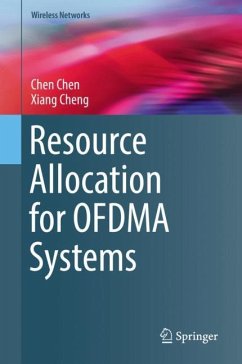
Resource Allocationin OFDMA Network
Efficient Resource Utilization, Provisioning Quality of Service, Scheduling
Versandkostenfrei!
Versandfertig in 6-10 Tagen
39,99 €
inkl. MwSt.

PAYBACK Punkte
20 °P sammeln!
Resource allocation and scheduling in the downlink of OFDMA networks supporting heterogeneous traffic will be considered in this book. The purpose of resource allocation is to allocate sub-carriers and power to users to meet their service requirements while maintaining fairness among users and maximizes resource utilization. To achieve these objectives, utility-based resource allocation schemes along with some state-of-the-art resource allocation paradigms such as power control, adaptive modulation and coding, sub-carrier assignment, and scheduling are adopted. On one hand, a utility-based res...
Resource allocation and scheduling in the downlink of OFDMA networks supporting heterogeneous traffic will be considered in this book. The purpose of resource allocation is to allocate sub-carriers and power to users to meet their service requirements while maintaining fairness among users and maximizes resource utilization. To achieve these objectives, utility-based resource allocation schemes along with some state-of-the-art resource allocation paradigms such as power control, adaptive modulation and coding, sub-carrier assignment, and scheduling are adopted. On one hand, a utility-based resource allocation scheme improves resource utilization by allocating enough resources based on users' quality of service (QoS) satisfaction. On the other hand, resource allocation based on utilities is not trivial when users demand different traffic types with convex and nonconvex utilities.












